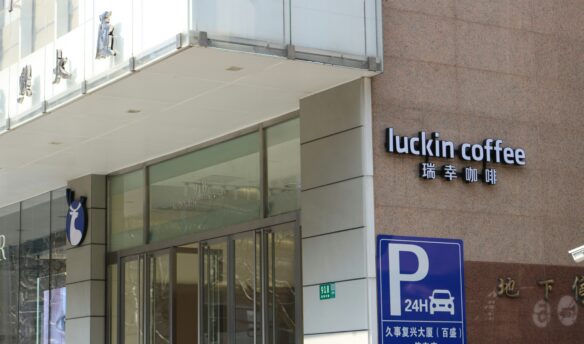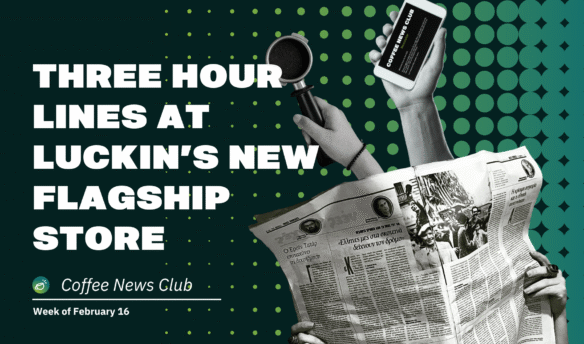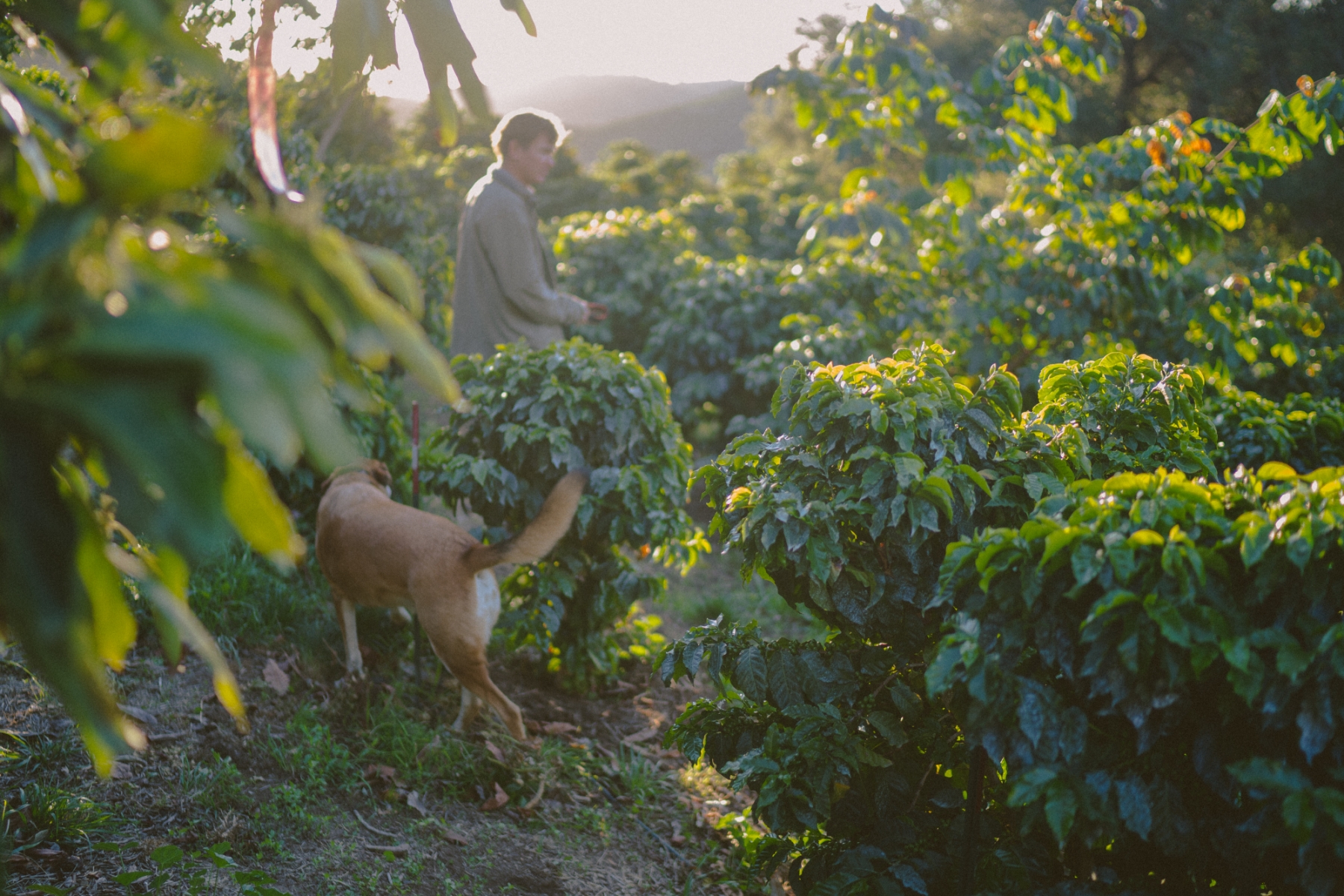Coffee prices are so high that coffee cherries are being stolen right off the branch. Plus, Keurig gets fined for misleading recyclability claims, and the new Starbucks CEO hopes to turn the brand around by transforming stores into—if you can believe this is the plan—coffee shops.
But seriously—scroll to find out the CEO’s plan for the stores. That and all the news you need to know in the coffee world for the week of September 15th.
‘Coffee Is Now So Expensive That Farms Are Becoming Crime Scenes’ – via Bloomberg
Coffee prices have risen sharply over the last few months. While that’s generally good news for farmers, a new problem has popped up: coffee cherries are being stolen right off the branch.
In Uganda, producers are patrolling their plots during the night to prevent theft. Local coffee organizations have proposed farmers hire security guards or use animals like dogs or bees to protect their land, Fred Ojambo wrote for Bloomberg.
Trees are being stripped of coffee cherries, with some plants missing whole branches, damaging the tree and impacting future productivity. Stolen cherries are being sold to intermediaries and end up in the supply chain. Because there’s no discernment for ripeness—ripe cherries are as likely to be taken as unripe—Ugandan coffee is seeing a dip in quality.
Authorities haven’t gathered much data on these crimes yet, but spokespeople from two of Uganda’s coffee associations say the number of theft-related incidents is higher than in recent years. Ronald Buule, executive director of Uganda’s Central Coffee Farmers Association (CECOFA), blamed the rise in theft “due to the fact that prices of coffee have gone higher than before.” The increase also coincides with rising food prices and inflation.
The CECOFA continues to urge farmers to improve security measures to protect their crops. “The association recommends that growers invest in fencing, security guards and dogs, and bees to fight crime,” wrote Ojambo. “More farmers have been keeping apiaries to aid pollination, but the idea is that they will now also scare away thieves worried about being stung if they upset hives.”
Buule, a coffee farmer, told Bloomberg that he hired ten guards to keep watch on his farm overnight during harvest season. But most farmers can’t afford to hire extra security and must patrol their land.
Leaders of coffee cooperatives are worried productivity will suffer if the underlying issues driving the uptick in thefts aren’t addressed. “Certainly thefts will discourage efforts by farmers from investing if something is not done,” said Richard Muganzi from the Masaka Cooperative Union.
‘Starbucks’ New CEO Wants to Make Starbucks a Coffee Shop Again’ – via CNN
At the beginning of September, Brian Niccol took over as Starbucks CEO, and his onboarding into the new job was bumpy. News outlets ran headlines calling attention to his CEO salary (he received a compensation package estimated to be worth $113 million) and the fact that he planned to “commute” to Starbucks HQ in Seattle from California via private jet.
Niccol’s first move as CEO was to publish an open letter laying out his vision for the company. Starbucks has “drifted from” its original role as “a community center where conversations are sparked, friendships form, and everyone is greeted by a welcoming barista,” he wrote. Instead, he said the brand has veered towards a more “transactional” approach where “menus can feel overwhelming, product is inconsistent, the wait too long or the handoff too hectic.”
He specifically calls out Starbucks stores in the United States—many have shifted their focus towards quick service, drive-thru, and mobile ordering while increasing menu options and promotions. This has led to longer wait times, annoyed customers, stressed workers, and falling stock prices.
“Today, I’m making a commitment: We’re getting back to Starbucks,” Niccol wrote. “We’re refocusing on what has always set Starbucks apart — a welcoming coffeehouse where people gather, and where we serve the finest coffee, handcrafted by our skilled baristas. This is our enduring identity. We will innovate from here.”
Niccol promised to make stores “inviting places to linger” by adding more comfortable seating options. He also said he plans to invest in “technology that enhance[s] the partner and customer experience, improve[s] our supply chain and evolve[s] our app and mobile ordering platform.”
How much of a difference Niccol will make remains to be seen. An article in Restaurant Dive interviewed several restaurant branding and operations experts who seemed skeptical Niccol could execute his plans. “It’s hard to satisfy both that third place customer as well as that convenience customer in the same location,” R.J. Hottovy from location analytics company Placer.ai told Aneurin Canham-Clyne of Restaurant Dive.
Most of the analysts interviewed for the Restaurant Dive story think that the best Starbucks can hope for is a return to steady growth, which is reliable but may not look great on a quarterly earnings report.
“Coffee and tea drinks are never, ever going to decline, people are always going to want those things,” said Chris Hydock, a professor at the Freeman School of Business at Tulane University. “But once you capture the market in terms of customers and the kind of product assortment that you can realistically offer, the path of growth just gets really, really narrow.”
‘A Private Equity Firm Saved Beloved Portland Restaurants From Bankruptcy. Then it Stopped Paying its Bills’ – via Oregon Public Broadcasting
Things were volatile for small business owners in the US during the first years of the COVID-19 pandemic. Many hospitality businesses struggled as customers were forced to stay home, and the costs of goods went up because of inflation. Thousands of businesses—many of them beloved coffee shops—shut down during this time.
But in Oregon, a private equity fund named Sortis Holdings rescued dozens of struggling businesses: the firm bought pizzerias, sushi restaurants, and coffee shops. “The chairman of Sortis, Portlander Paul Brenneke, told Portland Monthly that Sortis was a ‘white knight,’” Lillian Karabaic wrote for Oregon Public Broadcasting, helping keep many businesses open.
But problems soon cropped up, and just like that, the money disappeared and businesses began closing.
Karabaic’s story details the many issues with Sortis: Landlords sued the company for not paying rent, invoices went unpaid, and staff turnover was high. Working in this environment proved challenging. “There were many times where you would have to call someone at Sortis to use one of their personal cards to pay for [supplies],” said Tyler Zaiss, who was in charge of the roastery side of the business. “Whether it was printer ink or coffee bags or moving roasted coffee to our co-packer in Seattle to make cold brew.”
The firm created a coffee-specific subsidiary, Coffee Business, which owned Water Avenue Coffee, See See Motor Co. and Seattle-based Mr. West. “Man, there’s such a wealth of good founders — how can this lose?” See See co-founder Thor Drake told OPB, recounting how he felt when Sortis first approached him to buy his coffee business in 2020.
Sortis, now renamed SoHi Brands, paid the owners in stock and kept them on as salaried employees. They also had big-time goals to expand: At one point, the company planned to open 25 new cafes in six months.
Many of the businesses under Sortis are still figuring out what’s next. Many of the original founders moved on, the stock they were given rendered virtually worthless.
Sortis representatives declined to speak to OPB. Litigation is still pending, but in the meantime, Drake reclaimed his business. Now called One Moto, he brought back staff members and reopened in the original cafe location, telling Karabaic: “I’m not the kind of guy who gives up.”
More News
‘Red Bay Coffee Files for Chapter 11 Bankruptcy in Oakland’ – via Daily Coffee News
‘The 2025 US Coffee Championships Regional Host Cities Have Been Announced’ – via Sprudge
‘Iconic Oregon Coffee Shop Chain Seeks $250K to Stay Afloat’ – via Daily Coffee News
‘Robustas Reach 47-year High for Two Consecutive Months: ICO report’ – via Global Coffee Report
‘Outback Coffee Van Near Cameron Corner Mistaken for a Mirage by Tourists’ – via ABC News Australia
‘Second International Coffee Convention Happening in Germany’ – via Daily Coffee News
‘Illycaffè’s Università del Caffè Marks 25 Years’ – via Global Coffee Report
‘LA Roaster Angelino’s Coffee is Buying the World’s Most Prized Coffees at All Costs’ – via Daily Coffee News
The Week in Coffee Unionizing
In Seattle, workers at Cherry Street Coffee House went on strike, shutting down all four of the company’s stores in protest of owner Ali Ghambari’s support for a city council bill allowing small businesses to pay staff less than minimum wage.
The provision applies to businesses “that employ fewer than 500 people to pay workers below the standard minimum wage as long as customer tips make up the difference,” Hannah Krieg wrote for the Stranger.
Ghambari spoke at a city council meeting in favor of the “tip crediting” bill. Afterward, employees organized, calling themselves Cherry Street Workers United. Several workers quit, and the rest walked out on August 17, forcing one Cherry Street location to close. “[Workers] alleged routine sexual harassment in the stores and demanded that the company adopt a formal anti-harassment policy; they also demanded schedules three weeks in advance, a permanent raise, and notice for major hour reductions and store closures,” Krieg wrote.
“Thank God this had consequences,” Emma Komar, one of the workers who quit, told the Stranger. “The fact that [Ghambari] had to shut down a store is proof of how much power we have as workers.” After initial negotiations, workers shut down all four stores.
The bill that sparked the protest has since been retracted, and Ghambari told Capitol Hill Seattle that he plans to reopen the stores “this month.”
“These are people that have resources, they have capital, they’re able to reach people on the City Council. And we’re just all showing up to work, just trying to try to make sure our bills are paid,” Conor Dolan, a Cherry Street worker, told the Stranger. “But we’re still very powerful.”
The Week in Corporate Coffeewashing
Not for the first time, Keurig Dr Pepper has been fined for making misleading statements about the recyclability of its plastic coffee pods. The Securities and Exchange Commission (SEC) said that the company claimed in its 2019 and 2020 annual reports that its pods “can be effectively recycled.”
“But Keurig did not disclose that two of the largest recycling companies in the United States had expressed significant concerns to Keurig regarding the commercial feasibility of curbside recycling of K-Cup pods at that time and indicated that they did not presently intend to accept them for recycling,” the SEC wrote in a press release.
Keurig has agreed to pay a $1.5 million penalty without admitting or denying the SEC’s findings. “We are pleased to have reached an agreement that fully resolves this matter,” a spokesperson told Jaclyn Diaz for NPR.
It’s not the first time Keurig has faced fines for misleading sustainability statements: its Canadian subsidiary was fined $3 million in 2022 for misrepresenting its pods’ recyclability to consumers, and they also lost a $10 million class action lawsuit for making similar claims.
Beyond the Headlines
‘When You’re Here, You’re Not Family’ by Ashley Rodriguez
‘Inside The New UC Davis Coffee Center’ by Jenn Chen
‘Please Just Let Millennials Enjoy Our Coffee’ by Fionn Pooler








